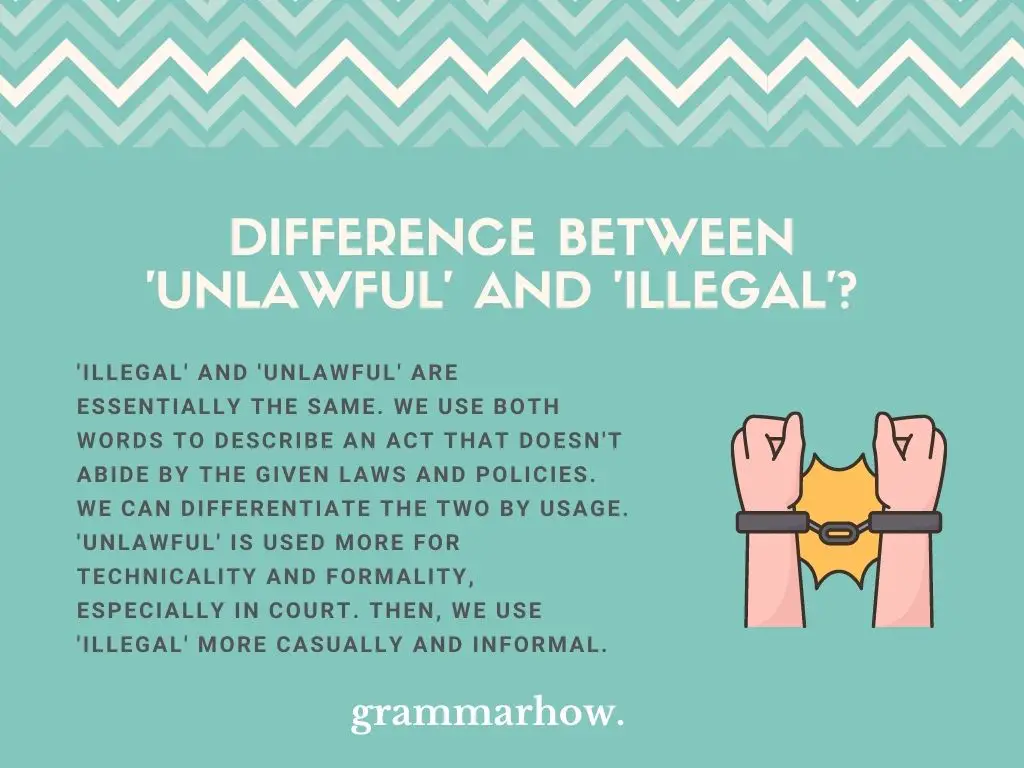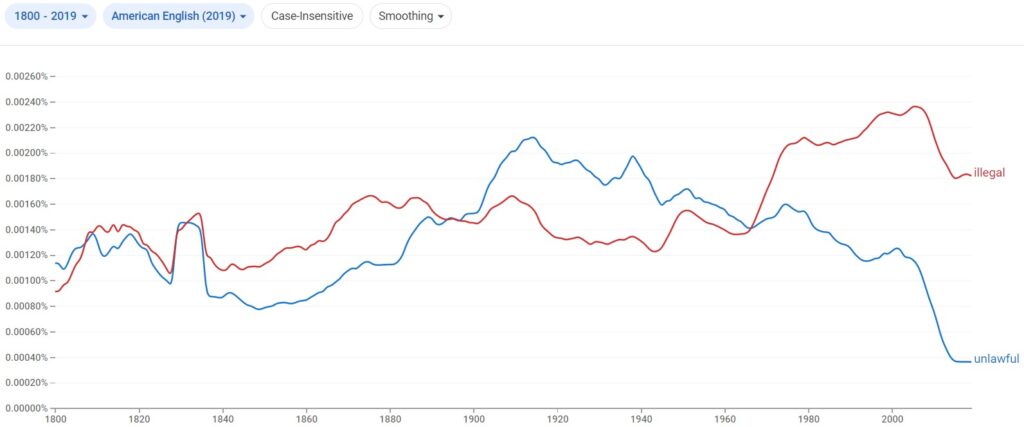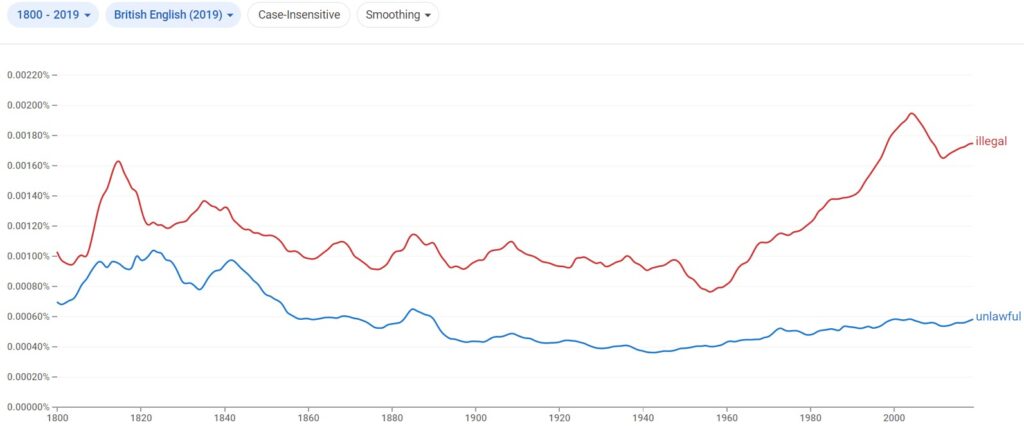With the never-ending list of words that the English language has, it’s no wonder that some words overlap in meaning. That’s even why synonyms exist. However, not all synonyms are interchangeable! That’s what makes things more confusing. For ‘illegal’ and ‘unlawful,’ are they the same? Are they different? Let’s see!
What Is The Difference Between ‘Unlawful’ And ‘Illegal?’
‘Illegal’ and ‘unlawful’ are essentially the same. We use both words to describe an act that doesn’t abide by the given laws and policies. We can differentiate the two by usage. ‘Unlawful’ is used more for technicality and formality, especially in court. Then, we use ‘illegal’ more casually and informal.

There are more minor differences we can nitpick but are not regarded or recognized by many. If we want or need to be specific, we can use ‘illegal’ to describe criminal acts, while we use ‘unlawful’ to describe violations against laws that are not crime-centered–like contract laws. However, this is a minor difference that many people disregard. In most, if not all cases, the two given words are still interchangeable.
What Does ‘Unlawful’ Mean?
‘Unlawful’ is an adjective that describes an activity or an act that does not follow existing laws and policies. Specifically, we use it to express a violation of non-criminal laws like contract laws. We use ‘unlawful’ casually and even in formal English, like in a court session.
According to the Cambridge Dictionary, ‘unlawful’ means ‘not according to or acceptable to the law.’
Below are examples of how we use ‘unlawful’ in a sentence.
- Employees and students are allowed to protect themselves against the abusive and unlawful use of authority in organizations.
- The news agency reports new unlawful activities done by politicians every day.
- There was an implementation of stricter punishments in the company due to the unlawful behavior of employees who discriminate.
- That private sector industry had an unlawful hike in the price of goods, so the government is currently investigating the matter.
- People with certain mental conditions may not be morally held liable for their unlawful behavior.
- Discriminatory acts like racism, sexual orientation discrimination, and such are unlawful acts no matter where they happened.
- They recruited me to be part of some unlawful activity. Fortunately, I had the chance to decline.
- During the dictatorship of the president, any printed news or propaganda that was against him was considered unlawful material.
- The petitioners seek to lessen unlawful activity among state leaders through petitioning for transparency and accountability.
- When you breach a person’s privacy, your data collection becomes unlawful to the person’s right to privacy.
What Does ‘Illegal’ Mean?
‘Illegal’ is an adjective that describes an activity or an act that violates and neglects existing laws and policies. Specifically, we use it to express a violation of criminal laws like theft or homicide. We use ‘illegal’ mostly casual rather than formal. Though, it may still be acceptable formally.
According to the Cambridge Dictionary, ‘illegal’ means ‘not allowed by law’ and ‘against the law.’
Below are examples of how we use ‘illegal’ in a sentence.
- Young children are allowed to protect themselves against the abusive and illegal use of authority in the household.
- The official gazette reports new illegal activities done by politicians every day.
- There was an implementation of new rules and policies in the organization due to the illegal behavior of members.
- Many private businesses had an illegal recruiting of workers and employees, so the government is currently investigating the matter.
- People with certain mental conditions may not be morally held liable for their illegal behavior.
- We are an organization that does not tolerate illegal acts of theft, rape, discrimination, and smuggling, among many others.
- They recruited me to be part of some illegal activity. Fortunately, I had the chance to decline.
- During the dictatorship of the president, any form of resistance and stand against the president was considered illegal.
- The petitioners seek to lessen illegal activity among people in poverty through petitioning for an improved life for the poor.
- Touching a person without their consent is illegal and breaches their personal space.
Are ‘Unlawful’ And ‘Illegal’ Interchangeable?
‘Unlawful’ and ‘illegal’ are interchangeable. The two words are synonymous in meaning, so we can easily interchange them with one another. Though a difference or distinction exists, it is minor to the point of disregard. Moreover, if formal, you may use ‘unlawful.’ Then ‘illegal’ for something casual.
Below is an example of how the two words are easily interchangeable.
- The petitioners seek to lessen unlawful activity among state leaders through petitioning for transparency and accountability.
- The petitioners seek to lessen illegal activity among state leaders through petitioning for transparency and accountability.
Both sentences clearly express that petitioners want state leaders to abide by and follow the rules through petitioning for transparency and accountability.
Are ‘Unlawful’ And ‘Illegal’ Used Differently In The UK And The US?
According to the US Google Ngram Viewer and the UK Google Ngram Viewer, using ‘unlawful’ and ‘illegal’ in both countries are generally the same. For both countries, ‘illegal’ is used more than ‘unlawful,’ possibly because it is more understandable and casual.


The only difference between both countries is the trends of the two words. For the US, citizens used ‘unlawful’ more than ‘illegal’ in the 1900s. Compared to the UK, citizens used ‘illegal’ more than ‘unlawful’ throughout the years. The UK trends also seem more stable than the US trends.
Can Something Be ‘Unlawful’ Or ‘Illegal’ Without Being ‘Criminal?’
Technically speaking, in law, something can be ‘unlawful’ or ‘illegal’ without necessarily being ‘criminal.’ Only acts that violate criminal laws are ‘criminal.’ Thus, an act can be ‘unlawful’ because it violates a law. But, if the law violated is not criminal, then it is only ‘unlawful’ and not ‘criminal.’
In the set of laws a country or government employs, there are criminal laws and non-criminal laws. The classification of criminal laws differs across countries and nations. So, depending on what context can we determine if something is ‘unlawful’ and ‘criminal’ or just ‘unlawful.’
‘Unlawful’ And ‘Illegal’ Synonyms
Below is a set of words synonymous with ‘unlawful’ and ‘illegal.’
- Illicit
- Prohibited
- Banned
- Unauthorized
- Unwarranted
You may also like:
Illicit vs. Illegal – Difference Explained (With Examples)
Lawful vs. Legal – Difference Explained (With Examples)

Martin holds a Master’s degree in Finance and International Business. He has six years of experience in professional communication with clients, executives, and colleagues. Furthermore, he has teaching experience from Aarhus University. Martin has been featured as an expert in communication and teaching on Forbes and Shopify. Read more about Martin here.
